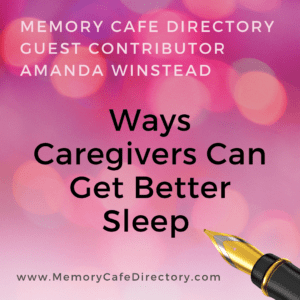Memory Cafe Directory posts and/or links to retailers can be advertising, sponsored, or affiliate links. We may earn a small commission from them. Thank you.
Ways Caregivers Can Get Better Sleep
Submitted by Guest Contributor
Amanda Winstead
Being a caregiver is a selfless and rewarding job. Whether you’re looking after a family member, friend, or caregiving is part of your job title, there is nothing in the world quite like it.
Caregivers are often associated with taking care of the elderly. That’s true in many cases. But, they can also care for those with injuries, chronic illnesses, or disabilities. As a result, their work is never really done.
That’s why it’s so important for caregivers to get enough sleep each night. If you’re caring for someone else’s well-being – especially someone with dementia – you have to be well-rested, healthy, and alert whenever you’re with your patient or loved one.
But, that’s often easier said than done. If you’re a caregiver and you know you’re not getting the rest you need, you could be putting yourself at risk of burnout. Let’s take a look at a few ways you can relax, alleviate stress, and get the much-needed sleep you deserve.
Why Do You Need More Sleep?
What’s the big deal with getting enough sleep? It’s about so much more than just feeling awake and alert during the day. First, caregiver burnout is a real thing. It can cause you to become physically, emotionally, and mentally overwhelmed to the point where you may not be able to do your job effectively.
Some of the most common signs of burnout include:
- Fatigue
- Body aches and pains
- Headaches
- Anxiousness
- Easily-irritable
- Depression
- Losing interest in the things you enjoy
Any one of these symptoms could cause issues with your ability to care for another person. You could end up getting seriously sick or mentally unwell to the point where you might need help, yourself.
Sleep allows your mind and body to fully recharge. It can reduce stress, and boost your immune system every night. It’s even more important if you’re already dealing with underlying health issues.
For example, if you’re going through menopause or other conditions that require hormonal regulation, getting enough sleep is crucial. Having healthy sleep habits can regulate your hormones and promote the release of natural growth hormones that will regulate your sleep cycle.
Modify Your Environment
Now that you understand the importance of getting enough sleep, what can you do to make sure you’re actually getting it?
Start with your Environment
Many people tend to use their bedroom for everything from watching TV to creating a makeshift home office. Unfortunately, using your room for anything other than sleeping can cause distractions. For example, if you have your office set up in a bedroom corner, you might toss and turn at night thinking about work, rather than sleeping.
According to the CDC, there are a few things you should put in place for a good sleeping environment, including:
- Making the area dark and getting rid of distracting lights
- Reducing noise
- Keeping the temperature cool
If you share a bed with a partner or live in a small house with others, their habits can also impact your sleep environment. It’s easy to joke about someone snoring, but when you’re trying to sleep next to that person, it’s no laughing matter.
Researching and purchasing an anti-snore pillow can make a big difference for them, and will help you both get a better night’s rest.
Create a Healthy Sleep Routine
In addition to creating the right environment, creating the right routine will also help you get better sleep. As a caregiver, you may have unusual working hours. Or, you might need to be available throughout the night if needed. But, that doesn’t mean you can’t put together a routine that allows you to get the most restful sleep possible when you finally get the chance.
Your routine should be the same every night, starting before you even set foot into your bedroom. It could include things like brushing your teeth, washing your face, and putting on pajamas. Try to get into bed around the same time each night, and set an alarm for the same time each morning.
Things like meditation, journaling, or reading a book using warm lighting can all be a part of your routine. Yoga, deep breathing exercises, and progressive muscle relaxation can also lull you to sleep. But, try to avoid things like watching TV or spending time on your phone or tablet. The blue light emitted from those devices can stimulate your brain and make it harder to fall asleep.
It’s OK to Ask for Help
Finally, if you know you’re not getting the sleep you need, don’t be afraid to reach out for help. As a caregiver, it’s your job to help others. But, that doesn’t mean you won’t need someone to lend a hand sometimes. Be specific with your needs when asking someone to help you, including letting them know when you need a good night’s sleep. By taking the best possible care of yourself, you’ll be able to give the best possible care to your loved one or patient.
Amanda Winstead

Amanda Winstead
Amanda is a writer from the Portland, Oregon area with a background in communications and a passion for telling stories.
Along with writing, she enjoys traveling, reading, working out, and going to concerts. If you want to follow her writing journey, or even just say hi you can find her on Twitter.
Become a Contributor!
 Do you want to be a Memory Cafe Directory contributor? If you have helpful information to share with our community, read about the guidelines, then get in touch to discuss what you have to offer.
Do you want to be a Memory Cafe Directory contributor? If you have helpful information to share with our community, read about the guidelines, then get in touch to discuss what you have to offer.
Thank you.






